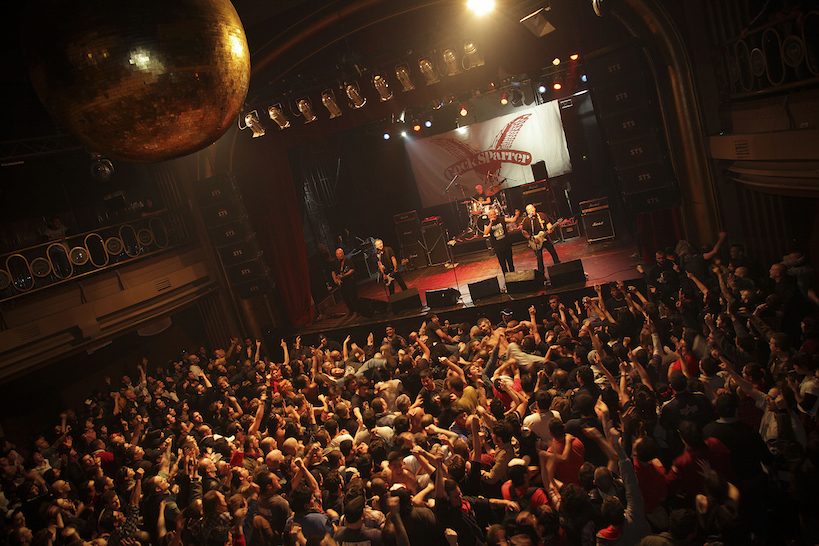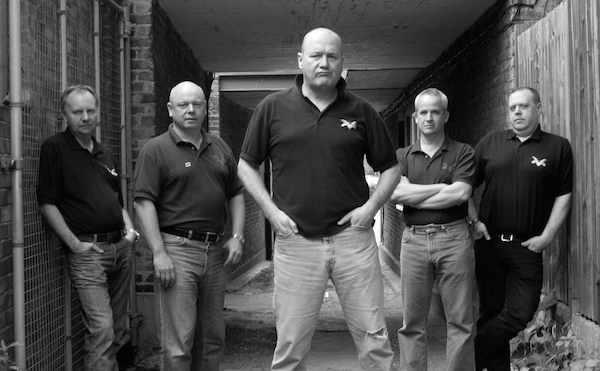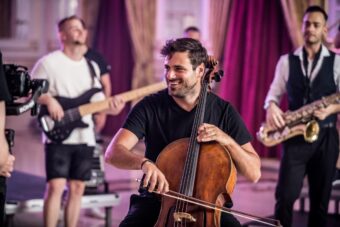“We’ve got to be honest, we don’t know how long this is going to run for us,” says Colin McFaull, sipping a beer on a Saturday afternoon in the bar of Brooklyn venue Warsaw. Dressed in a worn black hoodie, you’d be forgiven for mistaking the 59-year-old for just another middle-aged British workingman; that is, if you hadn’t seen him whip a room of a thousand into a frenzy the night before, hundreds of them shouting along to every word of the 17-song set. In a few hours, hundreds more will arrive to watch McFaull’s band, Cock Sparrer, for the second sold-out night in a row.
The original Cock Sparrer — frontman McFaull, guitarist Mickey Beaufoy, bassist/songwriter Steve Burgess, and drummer Steve Bruce — is, in fact, older than punk. They formed in 1972 as an adolescent super-group of sorts, assembled from their school’s garage bands. Four years later, as record companies clamored to cash in on the growing punk craze, they signed to Decca Records. While McFaull embraced the Rotten-Idol snide vocal style, and their sound was every bit as urgent as Northern Ireland’s Stiff Little Fingers, they refused to dress the part. “Imagine five collectively imageless Cockneys,” declared the British music newspaper Sounds. “Wearing clothes that look they pool from jumble sales.”
“It was one of those things where everybody said you have to wear these clothes to be a punk,” says McFaull. “And we said, ‘Bollocks you do.’ And that was all happening in a different part of London, anyway. That was over west with [Malcolm] McLaren and the [Sex] Pistols and the Clash. We never really bought into that.”
Rejecting Decca’s safety-pin direction, the band split from the label in 1978. Cock Sparrer tried to keep going, selling their possessions for one-way tickets to the U.S. – but they couldn’t find an audience in New York or Los Angeles, so the band limped home to England, believing Cock Sparrer to be a thing of the past.
Their luck changed in 1980, when “Sunday Stripper,” their pub-rock ode to a part-time exotic dancer, was included on the seminal Oi! The Album, a Sounds-produced compilation that officially gave a name to the back-to-its-roots second coming of punk. It took two more years for the band to reconvene, but the new direction would eventually lead them to make Shock Troops, one of the most influential albums of the era.
Their impact can be felt at the Warsaw. The first night, openers Murphy’s Law, a band that helped create the 1980s New York hardcore sound, attracted a sea of shaved heads; tonight, the Unseen — who, a decade later, helped start street punk renaissance out of Boston — bring in a more colorful (and spiky) crowd. But while their followers might have different styles, the bands — along with countless others, including Rancid, Agnostic Front, and the Dropkick Murphys — are clear descendants of their sound. And to Cock Sparrer, the diversity of their fans has been part of what makes these shows worth playing. “When you look out at a Cock Sparrer gig, there’s just as many boys as there are girls,” says McFaull, “and there’s just as many 16-year-olds as there [people who] remember it from the first time around.”
In 1983, Cock Sparrer released the aforementioned Shock Troops, an LP that fully embraced the booming singalongs Oi had become known for. Singles like “England Belongs to Me” and “Take ‘Em All” failed to chart, though the simple melodies and hooky choruses garnered them a following in the burgeoning skinhead scene. While London had always been tribal, with most crowds sub-dividing based on neighborhood or football club affiliation, the politics of the day began to seep into the scene. As neo-Nazi bands like Skrewdriver co-opted the boot-boy style and working-class ethos, an anti-fascist movement among skinheads quickly grew. But Cock Sparrer wanted nothing to do with the increasingly violent shows. “After Shock Troops was released, the whole scene was pretty septic,” remembers McFaull. “It was hard to get a gig. And when you did get a gig, there was a good chance that you wouldn’t be asked back.”
https://youtube.com/watch?v=6Ihdm66BTZg
They put out another studio album, Running Riot in ’84, before going their separate ways, but the members remained close. “First and foremost we take care of each other,” says McFaull. “If we weren’t here, we’d still be ringing each other, going down the pub.” And for most of a decade, that’s basically what they did. Then in 1992, a promoter asked if the band would reunite for a show at the London Astoria. They agreed, in turn inviting Daryl Smith, guitarist of local band the Elite, to join them for the show.
“The first rehearsal I went to, I thought, ‘I’ll be a bit quiet, see how I fit in,’” says Smith, who’s been an integral part of the band ever since. “It took two or three minutes until I realized they didn’t know any of their own songs.” Smith, just 20 at the time, had been covering Cock Sparrer as long as he’d been playing in bands, and was able to help hone their sound for the show. “They were probably my favorite band,” he says. “But it felt like family straight away. And as the years have progressed, they’ve got older and I tell them what to do. It’s brilliant.” (That first practice, in a surreal moment, they also discovered it had been Smith’s dad, a record executive, who’d originally signed them to Decca.)
In the 23 years since Smith joined onstage for what was supposed to be a one-off show, Cock Sparrer has put out three studio albums and played regularly across the U.S. and Europe, with each of the annual half-dozen or so dates handpicked by the band. But they don’t want to overstay their welcome, either, and the moment enthusiasm starts to wane, Cock Sparrer will happily go back into obscurity. “There’s always a reservation,” says McFaull. “Do people wanna come? Are they gonna enjoy it?” But it’s clear from the Warsaw that, for now at least, the fans will be there. “The noise the crowd made, it still makes the hairs on the back of our neck stand up,” says Smith. “Well, those of us with hair left. It’s still quite humbling.”






